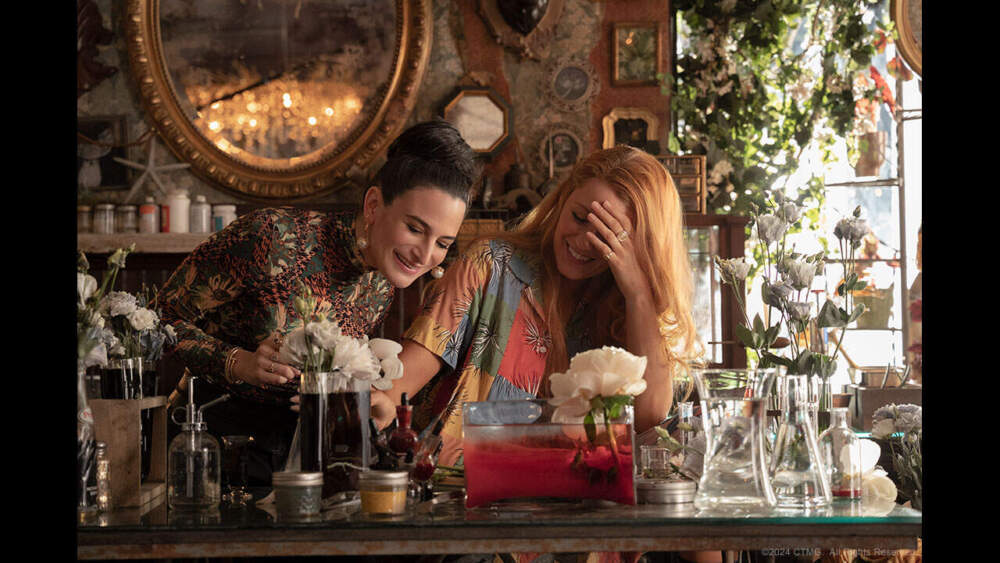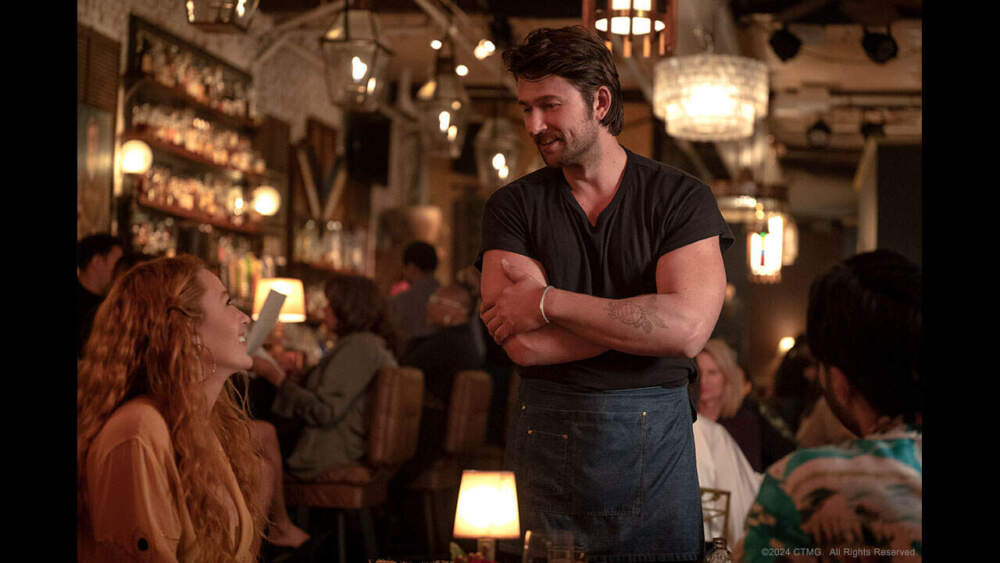Advertisement
Review
'It Ends with Us' is a soapy fantasy of heartbreak and resilience

These have got to be the richest people in the history of Boston. Director-star Justin Baldoni’s hotly anticipated adaptation of Colleen Hoover’s beloved bestseller “It Ends with Us” takes place in an imaginary Back Bay of almost comical opulence, where everyone is beautiful and under 40 and they all appear to have a professional stylist on call at all times. (You’ve never seen people so primped to watch a Bruins game at the world’s cleanest sports bar.) Every detail in the film is as finessed as one of star Blake Lively’s strawberry blonde tresses, which are granted an ethereal glow by cinematographer Barry Peterson. There’s an early birthday party sequence so lavishly appointed it’s like Edith Wharton without the barbed class consciousness, Baldoni’s camera gorging on the material extravagance the same way it lingers lovingly on his own washboard abs and Lively’s never-ending legs.
And why not? This is where most critics like to remind readers what good Marxists we are and complain about “conspicuous consumption” or whatnot, when in actuality, one of the most pleasurable things about going to the movies is seeing larger-than-life projections of the kind of pretty people you never meet in the kind of amazing places you’ll never be able to go. (Don’t bother trying to find this movie’s Boston. Aside from the Zakim Bridge-heavy establishing shots, it was filmed mostly on soundstages in New Jersey.) “It Ends with Us” leans shamelessly — and not unsatisfyingly — into the source material’s romance novel trappings, conjuring an outsized, soapy fantasy of heartbreak and resilience that only falters when it tries to ground itself in reality. I would have liked the movie better if it were even cornier.
In an era when most successful books sell a few thousand copies, Hoover has moved more than 50 million worldwide. Dubbed “CoHo” by diehard fans who call themselves “CoHorts,” the literary juggernaut self-published her first novel in 2011 and in 2022 her books sold more copies than the Bible. “It Ends with Us” came out to some success in 2016 but blew up on BookTok five years later, when pandemic-isolated readers started sharing the blubbery catharsis they found in the story’s wild rollercoaster of emotions.

It’s the tale of florist Lily Blossom Bloom — Hoover really has a thing for names — and her love affair with neurosurgeon Ryle Kincaid, whose tragic past has saddled him with a hair-trigger temper. Ryle’s jealous side surges after a chance meeting with Lily’s childhood love Atlas Corrigan — again, these names — a runaway teen who had been squatting in the abandoned house next door. Once upon a time, young Lily took him in and gave him food, clothing and her virginity, before her abusive dad burst in and put a brutal end to the affair. Now married to the violent Ryle, seeing Atlas again makes Lily realize that she’s turned into her mother — an abused woman making excuses for her husband. Both the book and the movie wonder if such cycles can ever really be broken, but I suppose the title constitutes a spoiler.
Hoover’s book has been the source of some controversy, mostly from op-ed writers insisting the romance novel is too trivial a medium for a subject as serious as domestic violence. It’s the same gatekeeping mentality that uses dismissive terms like “chick-lit” and talks down to people who enjoy something popular instead of engaging and trying to understand why it struck a chord. I’ll be the first to admit I’m a terrible snob and bailed on the book after 50 pages because Hoover’s prose style is decidedly not for me, but I also believe it’s a valid and honorable choice to bring spousal abuse into the realm of hunky brain surgeons named Ryle and soulful chefs pining for their first loves. You’re reaching people who wouldn’t necessarily sit down for more overtly issue-oriented material, along with reminding readers if it can happen in this storybook fantasy world, it can happen anywhere.
It takes a long time for the movie version of “It Ends with Us” to reveal its not-so-secret subject matter, to a point where it will probably sneak up on folks who have been enjoying a seemingly straightforward romantic comedy. Lively is such a charismatic, capable lead, I’ve often wondered why she’s never quite made the leap to movie star status. (I was sure it was going to happen in 2016, when she followed a role in Woody Allen’s “Café Society” with a nifty B-thriller called “The Shallows” in which she squared off against a shark. That’s range.) She’s got real chemistry with Baldoni’s Ryle, who looks like a more angular edition of ‘80s beefcake Harry Hamlin and tries to play off his absurd handsomeness as a joke. He’s too affable to sell us on the character’s abrupt shift into psycho mode, but then maybe it’s part of the point that we’re supposed to be as surprised by his outbursts as his wife is?

The screenplay was adapted by playwright Christy Hall, whose recent directorial debut “Daddio” was one of this year’s best films even though only about 12 of you went to see it. Best I can tell, she’s mostly punched up the dialogue here and mercifully removed the epistolary device of Lily’s backstory being revealed in a series of never-sent fan letters to Ellen DeGeneres. “It Ends with Us” walks a fine line of half-kidding the story’s romance novel conventions — Lively bursts into a giggle fit upon learning her beau’s profession — and ogling its own fashionista stylings and luxury porn settings. (Lily’s flower shop looks less like a conventional florist and more like a place where you can go live inside of Taylor Swift’s “Folklore” album for a little while. Not for nothing is a late-movie montage scored to “My Tears Ricochet.”)
I suppose the argument will be that not a lot of real-life women who are abused by their spouses are able to turn to a handsome high school sweetheart who has been staying chaste for two decades hoping to see them again, and obviously not many women have the seemingly inexhaustible resources and support system that Lively’s Lily has been gifted with in the storyline. But then, this movie doesn’t take place in anything resembling the real world. It doesn’t even look like Back Bay.
Advertisement
“It Ends with Us” is now in theaters.
